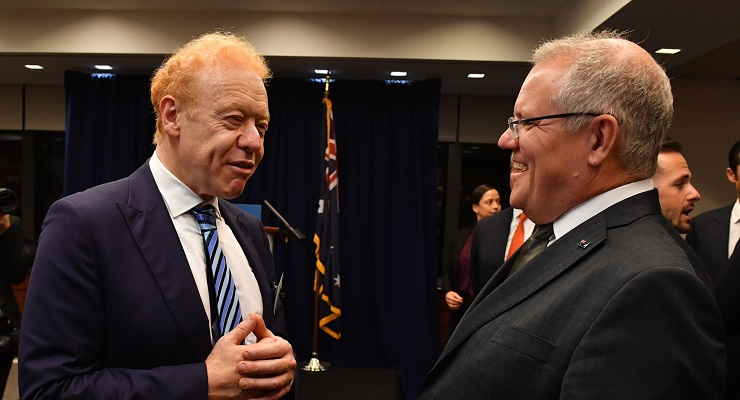
Never before have the world’s richest people been so exposed for how little tax they pay.
But the revelations this month from US investigative journalism outlet ProPublica (republished in Crikey) about the scandalously low tax bills of American billionaires may unfortunately be a one-off. The story was only possible after a leak from inside the US tax office, the Internal Revenue Services (IRS).
So any hopes of working out how much or how little Australia’s powerful billionaires pay relies on someone inside the Australian Taxation Office (ATO) leaking the same information. And given the experience of ATO whistleblower Richard Boyle, who faces a lifetime in jail for exposing its debt collection tactics, that is incredibly unlikely.
It’s a frustrating situation given that just like the United States, Australian billionaires have seen their wealth skyrocket during the pandemic, even as most workers watched their wages stagnate. The wealth of Australia’s 10 richest people has soared to $177 billion in 2021, up from $158 billion in 2020, according to the AFR’s latest Rich List.
The rise is just as stark when you look at the fortunes of Australia’s richest 200, whose wealth rose to $479.6 billion this year — nearly half-a-trillion dollars — up from $424.6 billion in 2020. On face value that’s an increase of 13%. Compare this with the average full-time Australian worker whose income rose 3.2% during last year.
Adding to the anger has been the shocking fact that many of Australia’s richest have benefited directly from pandemic-related government welfare, such as JobKeeper.
Labor MP Andrew Leigh estimates at least 12 billionaires have received dividends totalling tens of millions of dollars from companies that received JobKeeper. This includes retail mogul Gerry Harvey, who has refused to pay back the $22 million he received from JobKeeper despite his whitegoods empire Harvey Norman doubling its profits to $462 million during the pandemic.
Then there are other government grants and contracts that have ended up in the hands of companies controlled by the rich and powerful.
Billionaire and top political donor Anthony Pratt’s packaging empire Visy received $10 million from Australia’s bushfire recovery fund to boost productivity at its Tumut mill. And mining billionaire Andrew Forrest’s charity, the Minderoo Foundation, received $212 million from the federal government for COVID-19 test kits and PPE last year. The cost to the charity was not disclosed but it claimed to have not made a profit.
For years there has been a push for greater transparency on the tax affairs of the rich who can use sophisticated tactics to minimise what they pay. Just like the US billionaires exposed by ProPublica, Australia’s richest have an array of options to reduce their tax compared with average Australians.
The biggest one, says associate professor Dr Bruce Bradbury at the University of New South Wales, is to convert ordinary income into a capital gain, such as shares in a company, which can only be taxed once the asset is sold, at a far lower rate.
“That gives them a lot of flexibility to move their income into a lower tax rate,” he said.
There are also donations, including to foundations they control, allowing them to significantly reduce their personal income tax while promoting themselves as philanthropists. But because everyone’s personal tax affairs are private under Australia’s tax laws, it’s impossible to know exactly how billionaire’s donations affect their tax bills.
That could change. The ATO is considering a question put to it in Senate estimates that would require it to produce some anonymous data on income tax paid by billionaires. But the ATO tells Crikey it is considering the implications of the request — given it could “potentially inadvertently reveal details of the tax affairs of an individual or entity, which would breach our obligations of confidentiality under the law”.
“There is also an overarching concern around setting a precedent of publishing data about particular relatively small groups of individuals, where that data could be misleading or misused,” it said.
But Serena Lillywhite, chief executive of Transparency International Australia, says such information is vitally important given the public’s right to have trust in the system.
“The growing inequality in Australia is becoming more and more stark and the publication of the latest Rich List just demonstrates that,” she said.
“In order for the public to have confidence that we’ve got a fair and equitable tax regime in Australia, we need to have more transparency around what these people are paying.”
Would you like to get your hands on our billionaires’ tax bills? Write to letters@crikey.com.au, and don’t forget to include your full name if you’d like to be considered for publication.








It’s particularly annoying in that much of Australian billionaires’ wealth is really just luck; owning the rights to some lucrative resource. At least people like Bill Gates and Elon Musk were pretty smart guys who actually gave the world something new.
Or inherited…..
Speaking personally I am quite happy for my tax affairs to be public if that was the case for all no exceptions, seems more democratic.I would also ban the sales of pitchforks.
What happened to Shorten’s idea of restricting the amount that individuals can claim accountants’ fees as tax deductions, thus presumably their diligence to fighting paying income tax?
What is not mentioned in the article is that THE PENTECOSTAL and his bunch of crooks are wedging GOOD OLD ALBO and his bunch of crooks over the last lot of tax cuts.This will benefit the top end of town so they will be paying even less tax legally.
Taxation is not primarily revenue raising. It’s main role is to keep inflationary pressures in check. Governments don’t have to worry about where the money is coming from, but they should make sure their rich mates lose a bit of their spending power, to ease the burden on lower income earners who do have to worry about where the money comes from.